As an acoustic guitar player, one of the most important areas of upkeep on your instrument is undoubtedly your strings. Low quality or worn-out stings will almost surely have a negative effect on how your strings vibrate and thus the sound your guitar resonates. Many guitarists are overwhelmed by all the different types of strings out there. Choosing the right kind of strings for your play style is important, and there are other factors to consider as well including gauge, material, etc.
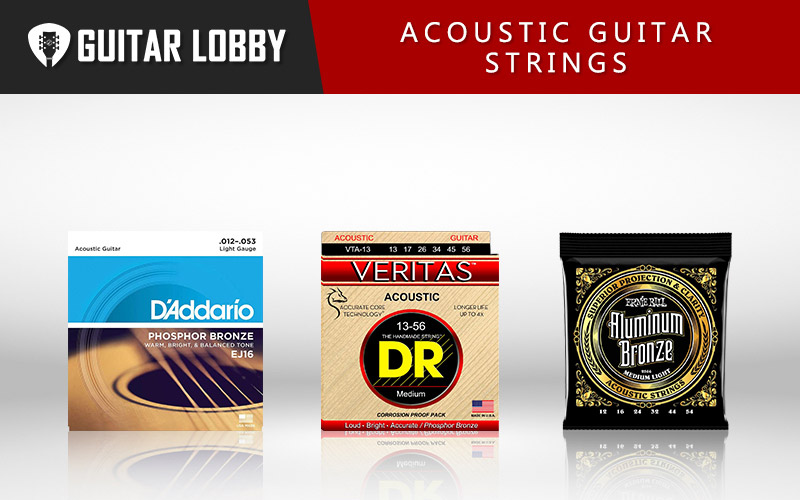
What we hope to do here is to give you the tools to choose the best acoustic guitar strings for your use cases. First, you’ll need to consider your skill level and hand strength while also thinking about what kind of sound you want from your strings. Do you want a brighter sound that is easier to play, or do you want a thicker sound from your strings that can hold up better when drop tuning? While there are hundreds of choices in strings for your guitar, there is a perfect set for you and your play style. All it takes is a little bit of research into what these different strings bring to the table for you as a Player. I’ll start this article by jumping straight into reviews on our favorite strings, but if you want to learn more about them before reading reviews, we have a lot of information for you at the bottom of the page.
| Name of Product | Image of Product | Description | Price Range | Full Review |
|---|---|---|---|---|
| 1. Ernie Ball Aluminum Bronze Acoustic Guitar Strings (Best Overall) | 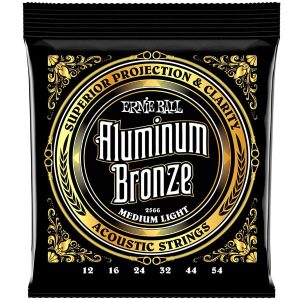 | String Gauge: Medium Light (.12-.54) | $10 | Read Full Review Below |
| 2. D'Addario EJ17-3D Acoustic Guitar Strings (Editor's Choice) | 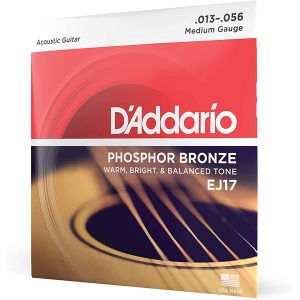 | String Gauge: Medium (.013-.056) | $7 | Read Full Review Below |
| 3. Ernie Ball Earthwood Phosphor Bronze (Best Value) |  | String Gauge: Medium Light (.012-0.54) | $7 | Read Full Review Below |
| 4. Martin SP7100 Coated Acoustic Strings (Best Strings for Beginners) | 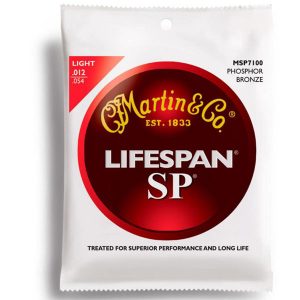 | String Gauge: Light (.012-.054) | $13 | Read Full Review Below |
| 5. Elixir Strings 80/20 Nanoweb Coated Strings (Best Coated Strings) | 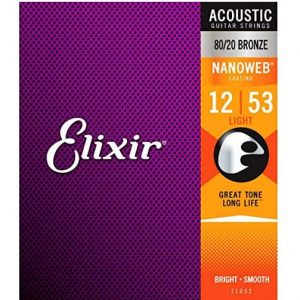 | String Gauge: Medium (.013-.056) | $15 | Read Full Review Below |
| 6. Martin MSP4150 SP Phosphor Bronze Acoustic Guitar Strings | 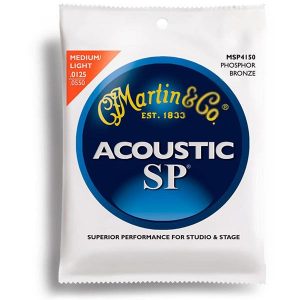 | String Gauge: Medium Light (.0125-.055) | $7 | Read Full Review Below |
| 7. D'Addario Phosphor Bronze EJ16-3d Strings | 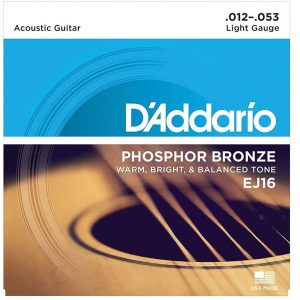 | String Gauge: Light (.012-.053) | $7 | Read Full Review Below |
| 8. Martin M140 Bronze | 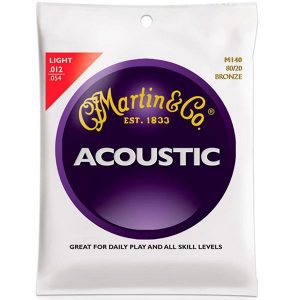 | String Gauge: Light (.012-.054) | $6 | Read Full Review Below |
| 9. Vibe Strings Acoustic Guitar String Set | 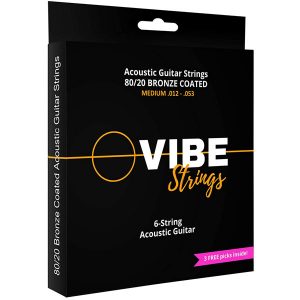 | String Gauge: Medium (.012-.052) or Heavy (.013-.058) | $17 | Read Full Review Below |
| 10. DR Strings VTA-13 | 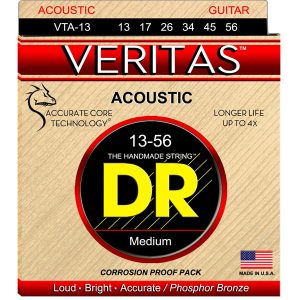 | String Gauge: Light (.012-.054) | $9 | Read Full Review Below |
| 11. Dean Markley Blue Steel Acoustic Strings | 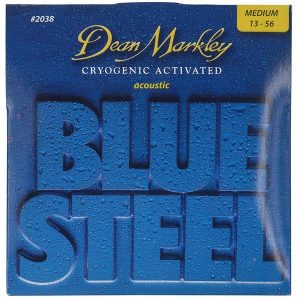 | String Gauge: Medium (.013-056) | $8 | Read Full Review Below |
| 12. Martin Titanium Core Acoustic Guitar Strings | 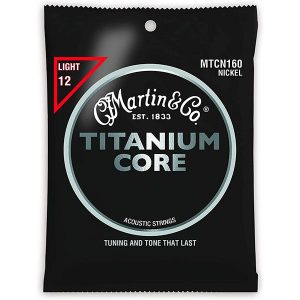 | String Gauge: Light | $40 | Read Full Review Below |
Here Are the Best Acoustic Guitar Strings (All Types)
1. Ernie Ball Aluminum Bronze Acoustic Guitar Strings (Best Overall)
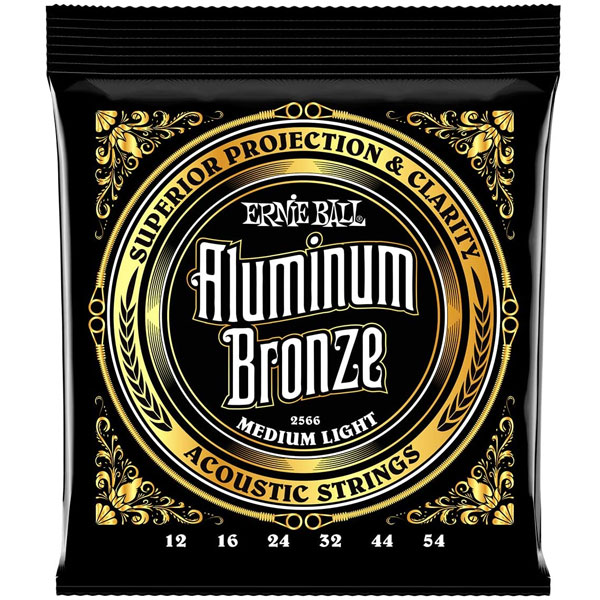
| Estimated Price | $10 |
| Recommended Gauge | Medium Light (.12-.54) |
My Review: As a guitarist, you will come to learn that your strings are going to take a beating. Whether it be from changing tunings to doing heavy bending and everything in between, you will need a set of strings that not only offer excellent tonality but can also take a beating. The Ernie Ball Aluminum Bronze acoustic guitar strings are the strings for you.
While playing, your strings will frequently be affected by changes in temperature, humidity, or just being touched by your sweaty fingers, causing dirt and grime to build upon your strings, taking away the brightness you want to hear. Usually, this is where coated strings would come into play, giving your strings the protection they would need from dirt, grime, and normal oxidization. But what if you are a player that does not like the sound or feel of uncoated strings? Are you just stuck with uncoated strings and forced to change them every few weeks? Thankfully, Ernie Ball has thought about this for those players.
The Ernie Ball Aluminum Bronze strings bridge the gap between coated and uncoated strings using aluminum oxide wrapping, rather than a coating, to offer protection without compromising sound quality and comfort.
While using these strings, I used the medium-light set, (.12, .16, .24, .32, .44, .54), and man were they comfortable. They offer a wonderfully bright sound that fits any music genre and is perfect for players who enjoy strumming and fingerpicking.
2. D’Addario EJ17-3D Acoustic Guitar Strings (Editor’s Choice)
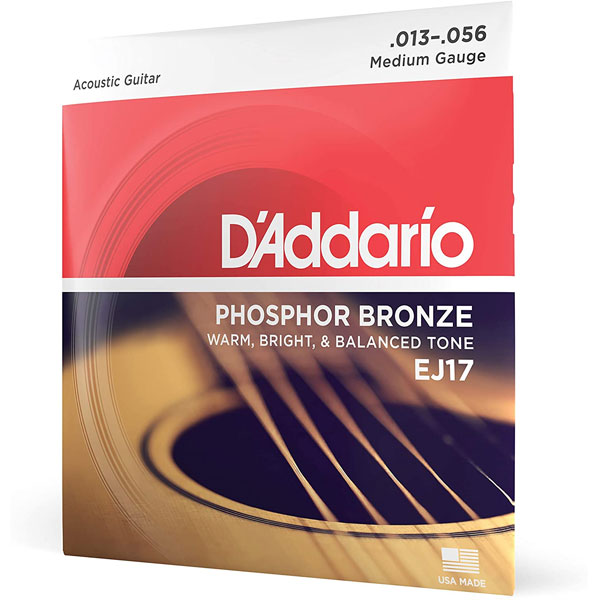
| Estimated Price | $7 |
| Recommended Gauge | Medium (.013-.056) |
My Review: These acoustic guitar strings provide a perfect solution to your complex needs, like producing a warm, well balanced, and bright tone. The made quality is something to be proud of – it is made in the USA, keeping in view the minutest attention to detail so that the musicians can concentrate where it matters the most.
It is hard to find a product that can match D’Addario EJ17-3D Acoustic Guitar Strings with durability in mind. These strings sound great for an extremely long time. As someone who frequently uses these strings, I had them on my Martin GPC-11e for almost a month and a half. They still sound as good as the day I put them on. Once you have them on your guitar, you do not have to worry about replacing them for a long time, which also means a little extra money in your pocket for a while longer as well.
The company introduced these strings back in the early 70s, and it has continued the production as the demand has only gone up. These strings are now a symbol of the most remarkable sound, balanced, and pleasing to the ears in every aspect. D’Addario EJ17-3D Acoustic Guitar Strings are carefully made from corrosion-free phosphor bronze, which is elegantly coated with stainless steel. All these high-end manufacturing ensures years of use.
These strings have a round wound construction, which is ideal for almost every musician. This build has been in the business for years, and most musicians feel comfortable with it. It ensures long hours of hardcore guitar playing without any pain or stress to the fingers.
These beautiful guitar strings are compatible with most acoustic guitars – you might have to cut the strings yourself once assembled. The longer length of the strings makes sure that they adjust with every guitar type. In my opinion, these are easily some of the best acoustic guitar strings out there.
3. Ernie Ball Earthwood Phosphor Bronze (Best Value)
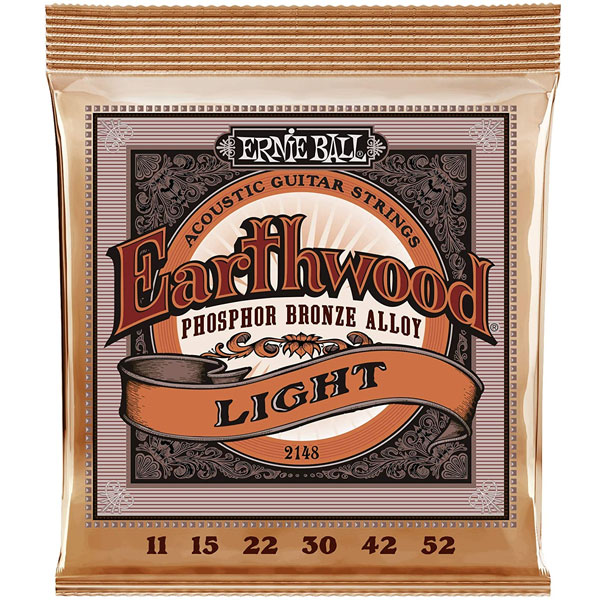
| Estimated Price | $7 |
| Recommended Gauge | Medium Light (.012-0.54) |
My Review: Another entry from the king of strings, the Ernie Ball Earthwood series, offers warmth and clarity and warmth that you would come to expect from a set of phosphor bronze strings. A very trusted name amongst guitarists and bassists, manufacturing guitars, basses, pedals, accessories – and of course one of their most popular products, guitar and bass strings. Ernie Ball’s electric guitar strings are probably the most used.
While their acoustic guitar strings do not quite enjoy the same level of popularity, it does not take away from them being very high quality and a fantastic choice for stringing up your acoustic. These strings offer more balance than most strings that I have used, and the treble and bass frequencies are nicely tuned to one another. These strings stand out well in solo performances. As mentioned before, the balance is incredible, allowing for great sound and clarity. Tone-wise, they sound great. Nice and rich, warm, clear, with just the right amount of brightness for our taste. They are also packaged well, with Ernie Ball’s Element Shield Packaging ensuring they stay fresh and do not prematurely oxidize.
Ernie Ball Earthwood Phosphor Bronze strings are made in California, USA, and are composed of 92% copper, 7.7% tin, 0.3% phosphorus wire. These strings have some considerable star power behind them, with artists like Paul McCartney, John Mayer, Brad Paisley, Billie Joe Armstrong, and James Bay all using the same strings.
4. Martin SP7100 Coated Acoustic Strings (Best Strings for Beginners)
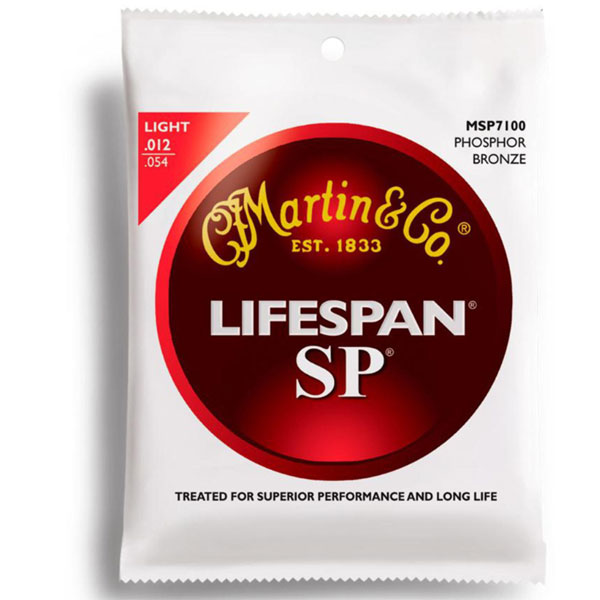
| Estimated Price | $13 |
| Recommended Gauge | (.012-.054) |
My Review: Martin uses the SP 7100 coated acoustic guitar strings on a majority of its higher-end Martin guitars to give users a professional experience. Martin decided to start packaging and selling these strings separately to allow all players to give these strings a try without purchasing a high-end martin guitar, which does wonders for one’s wallet. The SP 7100 strings feature precise tone property technology that provides full rush tones with long-lasting strings. These strings offer incredible tensile strength and response delivered by the ultra-pure steel SP core wire.
To protect and enhance this set of strings’ core wire, they have been electroplated with bronze and have bronze wraps that result in rich tones that players love. Martin uses their state of the art wrapping technique giving players extreme comfort and making the strings more comfortable to play. While most companies coat the wrap winding, resulting in lousy tone quality, Martin coats the SP 7100 just from the outside so that you are able to hear natural vibration patterns. With bright sound, precise tone proprietary technology, and lightweight factor, these strings are perfect for anyone who is wanting a fantastic set of strings that have an extremely long lifespan and have excellent tone quality. In my opinion, these are some of the best acoustic guitar strings for beginners on the market right now.
5. Elixir Strings 80/20 Nanoweb Coated Strings (Best Coated Strings)
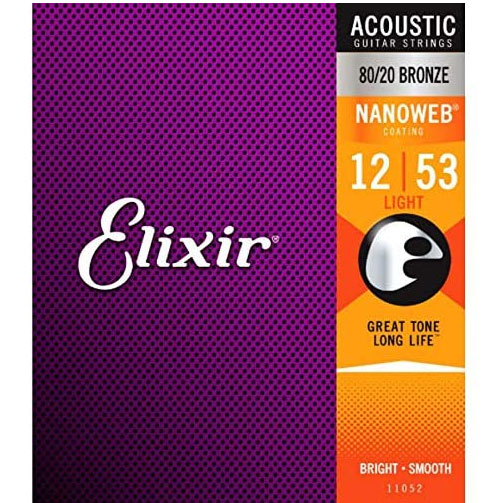
| Estimated Price | $15 |
| Recommended Gauge | Medium (.013-.056) |
My Review: Elixir Acoustic Nanoweb strings do not just sound great. Their micro-thin coating keeps them sounding great for a lot longer than average strings. If you want to keep your guitar tone consistently great day in and day out, put on a set of Elixir Acoustic Nanoweb strings. Their coating cuts down on unnecessary finger friction. You will be amazed at how long they last! Less string changes mean having to buy strings less often. Elixir’s Phosphor Bronze acoustic strings have an organic, focused, and vibrant tone, making them great for bringing the warmth and brightness out of dark-sounding guitars. Sweetwater guitarists have found phosphor bronze to be an excellent match for mahogany, Sapele, and similar guitars. And since they are coated with Elixir’s Nanoweb coating, they keep their vibrant tone longer than conventional strings.
These strings offer a characteristically vibrant and distinct sound from the phosphor bronze coating that can fit well in a solo setting or blend well in a group setting, making them extremely versatile. One of Elixir strings’ downsides is that they cost 2-3 times as much as competitors. However, keep in mind that one of the primary reasons these are so well-loved is because of their extreme durability. If you play every few days, there is no reason a set of Elixir NANOWEB should not last you a few months. Let us say you play 3-5 days a week; It is not uncommon for a set of Elixir strings to last you six months, whereas you would need to change uncoated strings every month or so. Regardless of how much you play, you will not see rust or dirt anytime soon, so you will be changing them less than other string brands.
6. Martin MSP4150 SP Phosphor Bronze Acoustic Guitar Strings
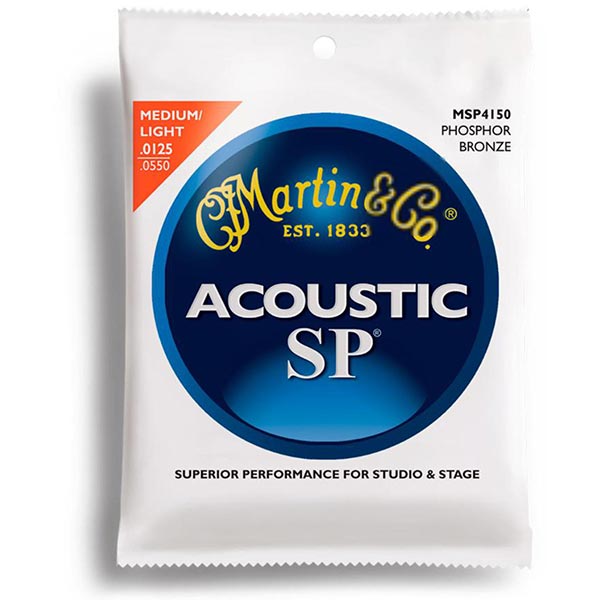
| Estimated Price | $7 |
| Recommended Gauge | Medium Light (.0125-.055) |
My Review: Classed as Light/Medium Strings, the Martin MSP4150 SP Strings for acoustic guitars are beloved by all new and old players. These strings offer a comfortable and playable feel while maintaining a substantially thicker feel like a medium string. Most new players will be comfortable and familiar with medium gauge strings. The MSP4150 SPs will make for an ideal transition.
These Strings offer fantastic sound on top of the already comfortable feel. As someone who has used these strings regularly as a beginner, I was impressed with the overall richness and tone created with these strings, making them perfect for picking and strumming. Most beginners may also find that it is easier to learn to pick with these as they are lighter than most sets that come standard on new guitars, making it much more comfortable to play.
The string gauges run from 12.5, 16.5, 25.5, 33.5, 43.5 to 55, and each string features a plated acoustic bronze finish. Many players like the subtle aesthetic difference this gives, but its real benefit comes in the strength and sound it delivers.
Along with the high-quality steel cores, the MSP4150 SPs have a smooth phosphor bronze plating designed to last. According to the manufacturer, they can stand up to the demands of playing in a studio, on stage, or wherever maximum string life is needed. While this may be more than an average beginner needs, it certainly gives newer players to start with a high-quality set of strings.
Of course, durable and long-lasting strings are not just useful for experienced players. When beginners are first learning how to play the guitar, having strings that are not easily broken is extremely useful. While durable strings are great when combined with the rich sound and tonal quality delivered by the Martin MSP4150 SP strings, they make them the ideal acoustic guitar strings for beginners. Anyone who wants to enjoy the excellent quality sound, hardwearing strings, and maximum comfort should try the Martin MSP4150 SP Phosphor Bronze Acoustic Guitar Strings.
7. D’Addario Phosphor Bronze EJ16-3d Strings
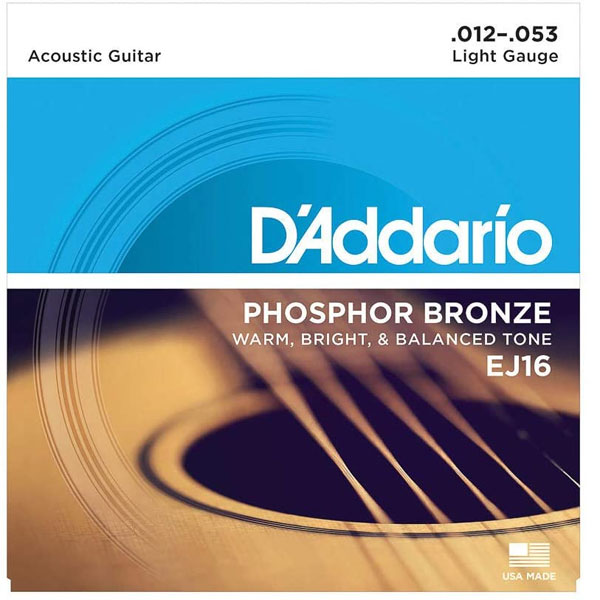
| Estimated Price | $7 |
| Recommended Gauge | Light (.012-.053) |
My Review: These strings are made of phosphor bronze, known for their warm and balanced tone, offering players great comfort and playability. These strings were introduced in 1947 with the phosphorus bronze built material to give players a longer-lasting and tonally unique set of strings. The company has done something different with these strings to bring a long-lasting, bright sounding tone with excellent intonation. Precision wounding with corrosion resistant phosphor bronze is carefully drawn onto a hexagonal-shaped high carbon steel core that makes these strings a reality for guitarists everywhere. D’Addario proves its love and passion for guitar string sets by producing this masterpiece. With warm tones, precision wounding, and up to 5 times longer lifespan, this acoustic guitar string set is worth investing your money.
8. Martin M140 Bronze
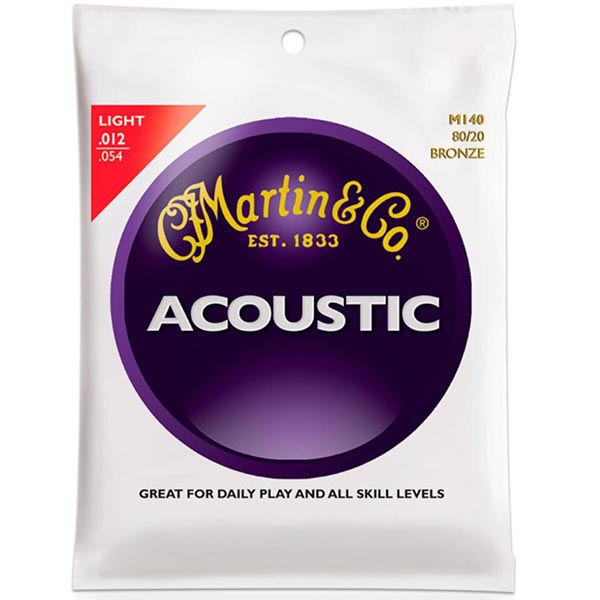
| Estimated Price | $6 |
| Recommended Gauge | Light (.012-.054) |
My Review: Another entry from a company aiming towards innovation and looking towards creating the best quality strings. Martin is making history by making state if the art strings at an affordable price. Players looking for clear and brilliant sound strings should check out this set of strings that sound fantastic and are very affordable.
The Martin M140 string set is made of an 80/20 bronze composition, which brings these strings to life and gives them a very distinct sound. Simultaneously, most string sets feature a steel core wrap that is not the case with the M140s. This acoustic string set is made by a bronze winding alloy that offers deep, rich basses and clear, bright trebles, with brilliant tones and longevity in regard to string life.
Whether you use these as your daily driver strings or using them for performances, these strings can take whatever you can dish out and deliver excellent sounds that fit any genre or venue. Martin can provide this since they use only high-quality materials to manufacture these strings. With these strings, you get professional-level quality at a price range that cannot be beat.
9. Vibe Strings Acoustic Guitar String Set
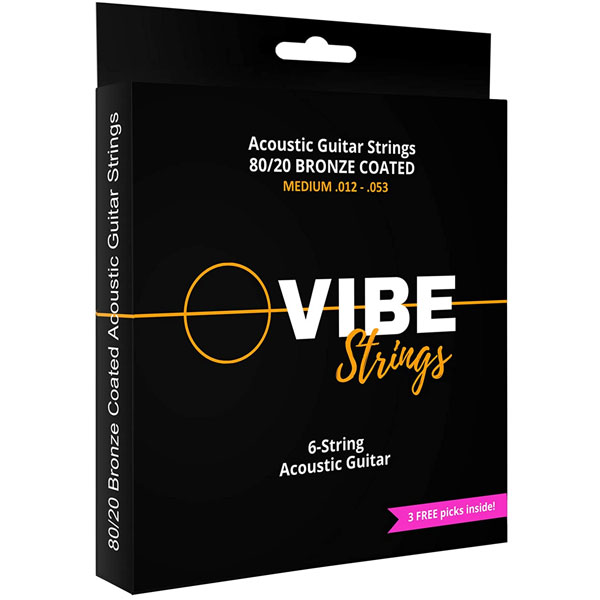
| Estimated Price | $17 |
| Recommended Gauge | Medium (.012-.052) or Heavy (.013-.058) |
My Review: To provide the freshest guitar string set possible, this company manufactures in small batches, so you get a great experience right out of the box. For years, vibe strings are amongst the best of the best guitar string manufacturers.
When you install Vibe guitar strings, you will notice the wonderfully balanced tones and crisp tonal quality that stands out even when compared to some of the best manufacturers in the business today. All that is achieved by the revolutionary step of using round wound phosphor bronze over a steel core.
To keep things in perspective, the package is vacuum packed so that the strings are not prematurely exposed to oxygen, causing oxidization, giving your strings a shorter life cycle. Similarly, when you put on the strings, you get a comfortable and familiar feel along with a bright and crisp sound.
No one likes to waste time tuning the new strings. Thanks to this acoustic guitar string set by vibe strings, they quickly settle with just a few minor re-tunings. Similarly, you get a clear and bright tone with a warmth that fits well with any genre or playstyle.
These guitar strings are perfect if you are looking for something with a professional feel to start your career.
10. DR Strings VTA-13
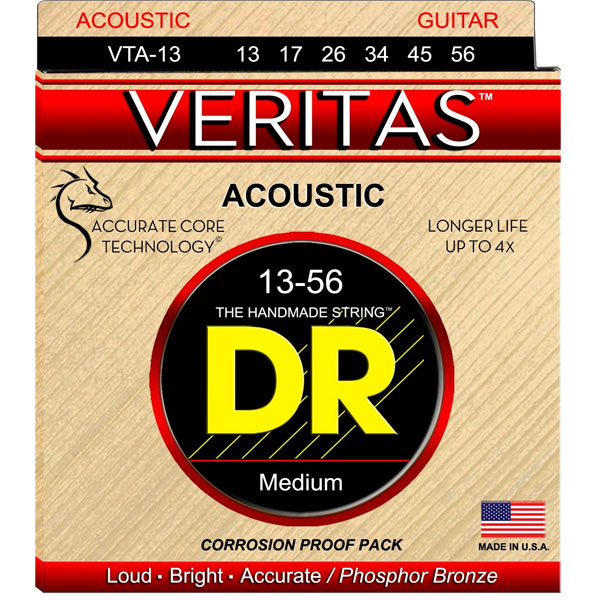
| Estimated Price | $9 |
| Recommended Gauge | Light (.012-.054) |
My Review: DR Strings believe that no one can beat handmade craftsmanship. They believe the old fashioned way delivers what is not possible with machines. Using the most advanced materials and practices, DR Strings make the impossible.
Veritas series by DR Strings was a completely new range of long-lasting Guitar String Set that was manufactured to last four times longer than other string sets on the market. Many professionals can use only one pack of veritas guitar strings to rock up many concerts.
VTA-13 is the new type of Phosphor bronze acoustic guitar strings in the series aimed at every musician out there. Veritas uses Accurate core technology to reinforce the core wire and fill in imperfections along with the whole core. That results in supreme stability and improved pitch retention, allowing for excellent sustain and incredible tone quality.
Speaking more about the core wire is the sole reason behind accurate tones, durability, and premium feel.
The core wire on these strings allows for accurate tone, excellent durability giving you a much longer life out of your strings and a premium feel that is exceptionally comfortable. Having comfortable allows for extended play sessions that do not leave your fingers feeling like they might fall off.
After installing these strings, you will notice the strings sound right out of the packaging and feel amazing. They deliver a robust and resonant tone that also provides excellent sustain and stability. While these might not be coated, they feel and play remarkably well for strings that I had never even heard of before writing this article.
11. Dean Markley Blue Steel Acoustic Strings
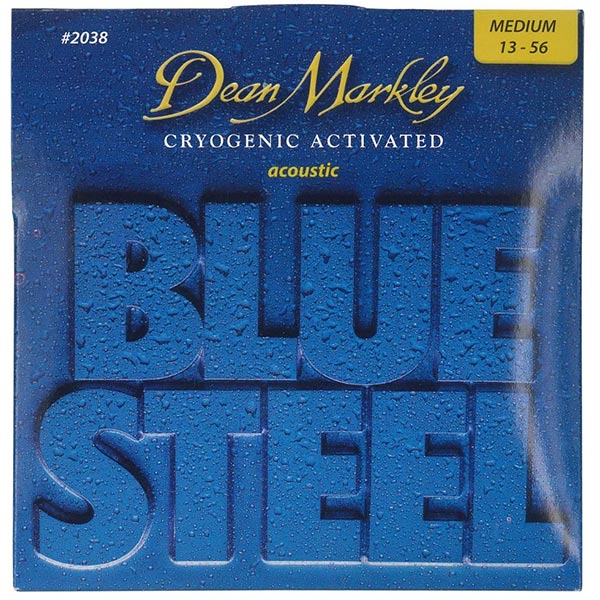
| Estimated Price | $8 |
| Recommended Gauge | Medium (.013-056) |
My Review: Dean Markley has made a truly incredible set of Vintage Bronze strings. For those who are unaware vintage bronze means that these strings are 92% copper and 8% zinc that gives the strings a very nice and brilliant tone. But what really makes these strings so special is the cryogenic freezing process, which aligns the molecules of the strings giving the strings that brilliant tone that I previously mentioned while also gives some longevity to that sound, giving them that same crisp sound you had when you opened the package two months down the line. These strings are also round wound, adding that crisp sound you get from the cryogenic process of the strings, means that you are going to have a really clear and bright sounding set of strings for a while and at under $10 these are quite a bargin.
12. Martin Titanium Core Acoustic Guitar Strings
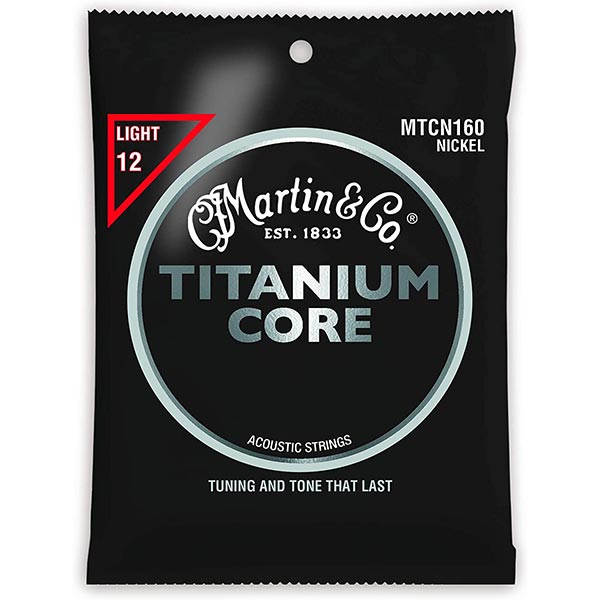
| Estimated Price | $40 |
| Recommended Gauge | Light |
My Review: Now I know I mentioned at the beginning of this article that I normally do not recommend these strings, but I couldn’t help myself, they are a really good set of strings. Martin is a name you hear as a guitarist and think ‘quality’ and that is definitely the case for the Martin Titanium Core acoustic guitar strings. What makes these strings so special is the fact that Martin decided to do away with the norm. Martin decided that bronze, copper, and steel just would not cut it for these strings.
Instead, Martin decided to go with a titanium core for the wound strings, and that they would be wrapped in pure nickel. These strings bring a lot to the table for guitar connoisseurs, being that they are also cryogenically frozen like the Dean Markley strings mentioned above giving them that same crisp tone. These strings also offer more protection from corrosion due to the Cryogenic treatment. These strings are also extremely comfortable, they feel incredibly smooth and are great for players that do a lot of gigging and need that one set of strings that will last for the long haul. Unfortunately as guitarists when we hear Martin the next word that comes to mind is ‘Expensive’ as these strings are also no exception. The Martin Titanium core strings fall in at a pricey $39.99 for a single set. As someone who has used a set of these strings to sate my own curiosity, I can say these are great strings that lasted me almost five months and they sounded great up until the end. I would recommend these strings for players that do a lot of traveling and playing that need a good set of strings that will last them a long time. Although more expensive than most of the strings on this list, these are some of the best strings for acoustic guitars out there.
Choosing the Right Acoustic Guitar Strings (Buying Guide)
This section is for those of you who want to learn more about guitar strings for acoustic guitars before reading reviews.
String Construction
There is not a lot to a guitar string, but all the individual components come together to create your sound’s lifeblood. Running through the middle of the string is a metal core wire. The core wire is affixed to a brass ferrule (commonly called the “ball end”), and the ball end is what typically holds the string on to the bridge. Around the metal core wire is another round wrap wire, which is the part that your fingers press against the fingerboard. These pieces combine to produce the type of sound that the different kinds of strings can make.
Acoustic Guitar Strings Usually Come in Two Varieties:
Phosphor Bronze and 80/20 Bronze. Phosphor Bronze strings are bronze strings that have Phosphor added to the alloy, giving them a much warmer tone. The Phosphor bronze strings are also great for players who might be a little bit lazier when changing out strings. The phosphorus gives these strings a little bit of a longer lifespan. On the other side, we have the 80/20 bronze strings. They are called 80/20 because they are made up of 80% copper and 20% zinc, giving the player a bright sound. On both the Phosphorus bronze and the 80/20 bronze, the highest two strings are plain steel like you would see on an electric guitar. Some strings use a titanium core wrapped in nickel, which looks more like electric guitar strings that allow less on the neck. I usually try not to recommend these strings as they are much more expensive than most of the market options today. A few more options are not as common as the three strings mentioned above, such as aluminum bronze that offer a more crisp sound, and nickel bronze with a very natural sound that does not color your guitar’s tone.
String Cores
The typical acoustic guitar string core is made of steel. The core is the center of the string with windings that go around the core to create larger wound strings. When making these strings, there are two distinct shapes used called round and hex cores. Round cores offer a fatter vintage tone that is balanced and more flexible. The more common core of the two is the hex-core that better holds on to their windings, giving players a brighter sound, and more consistent performance, while having stiffer tension than the round core.
Coated Strings
While we have our regular strings, we also have what are known as coated strings. Coated strings were introduced in the 1900s when guitarists were looking for a way to make their strings last longer because we all know how much of a pain it can be to change them or how expensive it can be to have someone else do it for you. Guitarists were becoming understandably frustrated that they would have to change strings after only a handful of gigs due to the oil and sweat (as well as natural oxidization) from their hands corroding the strings.
Companies began to rattle their brains for an idea on how to make their strings last longer for players. The idea was finally struck, and they decided to coat their strings with polytetrafluoroethylene, or what is commonly known as Teflon. This Teflon allows guitarists to play freely, without worrying about if they will have to change strings after this gig. This small coating of Teflon keeps all of the oils and sweat from coming into direct contact with the strings themselves. Another bonus is that Teflon also keeps the strings from coming in contact with oxygen, allowing them to oxidize at a much slower pace minimizing corrosion.
Pros and Cons of Coated Acoustic Strings
As with everything in life, these coated strings have their advantages and disadvantages. The Biggest thing that coated strings bring to the table is that they last much longer than their uncoated counterparts. This is because they are no longer able to build up dirt and grime from playing. Another pro is that there are no longer little valleys on the strings from the wire wrap finger noise is reduced to a minimum, which is excellent for players who use up close-miking while playing.
While this all sounds like a good deal, what are the drawbacks you might be asking yourself? Unfortunately, coated strings tend to lack in the tone department. Coated strings have lower sound output and reduced sustain. That tiny coating of Teflon you have on your strings is excellent for keeping the strings clean. It does not allow the strings to vibrate as freely as uncoated strings. While using coated strings on my guitar, I have noticed a slippery feel, which might be subjective. Most players will notice a completely different feel between both coated and uncoated strings for better or worse.
In the end, the choice comes down to personal preference for you, the player. A big part of being a musician is testing out, listening, and feeling these different strings out for yourself and see what feels comfortable for you. There are strings made by D’Addario or guitarists who do not like the feel of coated strings but want the longevity associated with this method. Whereas other manufacturers create a string THEN coat it, D’Addario differs by micro coating the inner materials and then winding it. This type of coating creates a more natural feel for the player and makes the strings last longer. Martin has also crafted an incredibly popular set of strings aptly entitled Martin Lifespan Phosphor Bronze Strings. Again, I suggest trying them out to see which set works and feels best to you.
String Gauge Considerations
Whether you are new to the guitar world or you have been around the block a time or two, you should know that not all guitar strings are the same. While in your journey in the world of music, you will undoubtedly use hundreds if not thousands of different sets of strings. The Biggest thing you can do as a player, as I mentioned before, is trying out different sets of strings.
An essential element in both the tone and playability of your guitar, string gauge (how “heavy” or “light” your strings are) can make a real difference in your sound. Gauge refers to the thickness of the string. Usually, players will refer to the first string’s size (the high E in standard tuning) when referencing their gauge preference.
So, where do these gauges come in to play when choosing your strings? Well, typically, the thicker the string, the more string tension. When there is more string tension, the harder it is to fret on your guitar. Some players prefer exceptionally light strings that require minimal effort to fret, making fingerpicking and faster playing more manageable. On the other hand, some players prefer the feel of fat heavy strings that are loud and sound great for strumming and much heavier playstyles.
There are many different sets and sizes of strings to try that may work well for you, or they might not be what you are looking for. This section will be going over the different size string gauges, how they affect your playing, what kind of sound they offer, and who they will benefit most from. Granted, this is mostly subjective. What works well for me may not work well for you, but let us get started without further ado.
String gauge is all-important when it comes to choosing the right acoustic strings for your guitar. Aside from the comfort and playability factors, the wrong set of strings can potentially damage your guitar. You have five primary string gauges, known as Extra Light, Custom Light, Light, Medium, and Heavy. These are the string gauge sets:
- Extra Light: .010 .014 .023 .030 .039 .047 – otherwise known as 10’s
- Custom Light: .011 .015 .023 .032 .042 .052 – otherwise known as 11’s
- Light: .012 .016 .025 .032 .042 .054 – otherwise known as 12’s
- Medium: .013 .017 .026 .035 .045 .056 – otherwise known as 13’s
- Heavy: .014 .018 .027 .039 .049 .059 – otherwise known as 14’s
When Choosing your string gauge, you should also consider:
- The body shape of your guitar
- Your playing style
- The age of your guitar
- The tonality you are looking for
Choosing Strings for Certain Guitar Body Styles
The body style can sometimes dictate what type of strings you should look to buy. For example, a Dreadnought guitar is suited to medium and heavier gauge strings, and as such, are usually supplied with what is known as 12’s or 13’s. They make guitars like this because the body is designed to resonate louder, and the heavier the gauge string, the more resonant and more audible the sound. The body and neck are more substantial on a larger scale guitar, too, so that they can handle the stronger tension these strings place on a guitar. Grand auditorium guitars are often shipped with 13’s and are quite suited to heavier gauge strings too. Parlour guitars and 3/4 size guitars are designed to take lighter gauge strings such as 11’s, 12’s, or lower. Parlour guitars and some 3/4 size guitars are not strong enough to take heavier strings and can sometimes bend or become damaged if they are used with heavier gauge strings over a long period, so always use a lighter or medium gauge string on these guitars. Because the body is not as large, they will not resonate as much, but if you have one of these guitars, that is the sound you are looking for! Many beginner guitarists have found that a heavier set of strings such as 14’s on a smaller scale guitar can damage the guitar’s neck, nut, and bridge. In contrast, larger-scale models will sound lifeless with a custom or extra light set of strings – it’s essential to get this right when choosing your guitar strings.
Other Big Considerations When Choosing Strings
What Is Your Playing style?
Do you mostly strum or finger pick? Are you a new player, or are you a seasoned player? While these seem pretty small issues, they factor into your string choice more than you might think. If you prefer to fingerpick, then you might like light strings as they are easier on your fingers, whereas strummers might choose the sound and feel of medium gauge strings as they feel better. While there are heavier strings, I would recommend that newer players try to stay away from these as they are tough on the hands and can make the learning experience uncomfortable and frustrating. But with practice, it will eventually become more comfortable as you will build finger and hand strength. I would again recommend experimenting and figure out what works well and sounds good to you.
The Age of Your Guitar
While it is doubtful that your first guitar will be a vintage Martin or Gibson, I feel this should be mentioned for veteran players who may not know a lot about strings. When choosing a set of strings, it is always a good idea to use your guitar’s age as a factor in determining your guitar strings. The biggest concern is damaging your guitar, possibly, beyond repair. When a guitar gets older, and the wood begins to age, it becomes more susceptible to damage and warping from incorrect strings gauges. Necks can start to bow, and bridges can move or possibly even snap off completely. I would personally recommend staying at a medium gauge or lower. If you are still unsure, I would perhaps take your guitar to a local shop and see what they have to say, or I would stick to lower gauge strings if that is not an option.
What Kind of Tone Do You Want?
One of the biggest things to consider when choosing your string gauge is the tone you are looking out of them, and while this is not quite as big of an issue for new players, it is still something to consider. If you want loud chords that ring out when you play, I recommend staying with medium or heavy strings. If you are looking for a little gentler sound that accentuates the treble notes on the higher lines with light strumming thrown into the mix, l recommend extra light to light strings. You also want to consider the type of music you play. Do you play heavier on your guitar? Heavier strings are recommended for you. If you do more lead work, bending your strings more, playing a little gentler, I recommend lighter strings.
What Strings Do We Recommend?
While there are hundreds of options to choose from while on your search for the best strings, we want to make that search a little less daunting by giving you a few options to consider. There are hundreds of different brands, models, and gauge options, so the task of finding the best strings for you can be a daunting task, but I have a list of go-to string models that have worked well for me in the past and should work well as a solid jumping-off point for new players who aren’t quite sure what to choose.
Understanding the Difference Between Classical Strings and Acoustic Strings
First of all, let us clear up one thing – both these guitars are acoustic guitars, except one uses a nylon string (classical), and the other uses a steel string (acoustic). Confusing, yes, but the differences between the two are vast!
A classical guitar uses nylon strings, whereas the modern acoustic uses steel-string, often referred to as a “steel-string acoustic.” These strings both sound and feel vastly different indeed. The nylon strings of a classical guitar are a lot thicker and mellower or softer sounding than those of a steel string.
With steel-string acoustic guitar strings, you get a very twangy and bright sound that resonates (lasts longer) than a classical guitar. They also feel hugely different. Nylon strings are thicker, and because the treble strings (G, B, high E) are nylon and the bass strings are nylon cores with metal or use a nylon winding technique on the E, A, D strings, it can be a lot more comfortable to play when you’re a beginner.
Steel-string acoustic guitars use various metals for strings, including nickel and bronze, and they are closer to the likes of electric guitar strings, i.e., thinner and somewhat sharper on fingers. Do not worry, though. With enough practice, your fingers will not hurt as much.
How Do I Know When to Change My Guitar Strings?
As a beginner, you may be unsure when the best time to change your strings would be. As time goes on, you will slowly learn, but I have five easy tips to tell when your strings have bit the dust and need to be swapped out for a new set.
1. Your Strings will not stay in tune.
Most of the time, tuning problems only occur with either brand new strings or incredibly old ones. When you first put on a new set of strings, you can combat tuning issues by stretching the strings the first few times you play on them. But once that period has passed, they should stay in tune. But If you notice that in two weeks to a month later that they are not holding a tune as well, it might be time to consider changing them out.
2. Your Guitars Tone is Dull
We are all familiar with the sound you get with a brand new set of strings. They are bright, present, and crisp. While some guitarists love the sound of brand new strings and change them every week to keep that same crisp tone, others might prefer the mellow sound you get from strings that are a little older. Regardless of your preference on tone, the tone should never be dull or flat, like the sound you get from old strings. If you notice your strings do not have that same bright sound they used to have, it is probably time to change your strings.
3. Your Guitar Strings Are Discolored
As we play our guitars, the oils from our hands begin to build upon the strings over time, leading to eventual corrosion and breakage. An early sign to look for when your strings are on their last leg is discoloration. As nickel and steel strings age, they begin to turn a dull gray color. Bronze acoustic strings lose their copper-colored sheen and turn a dark brown color. As you notice these discolorations, it is probably a good idea to get a new set of strings.
4. Your Strings feel stiff.
Unless you are playing heavier sets of strings, your new set should always feel flexible and bendable. Once they begin to feel stiff, it means the metal is in the process of corroding. The corrosion does not necessarily mean that your strings will break that day, but it does mean that your strings have begun to corrode and that they can break much easier. Not only that, but it also means that your guitar is not going to play or sound its best. When you begin to notice these early signs of corrosion, it is a good sign that you require a new set of strings.
5. Your Strings Feel Dirty
This one ties in with #3 just a little bit, but it is easier to feel your guitar strings age instead of seeing it. When you have a new set of strings, you should be able to slide your fingers along the strings, and it should feel smooth and almost slippery. If you begin feeling any friction between your fingers and the strings, it is a sign that dirt is getting in the way. Dirty strings tend to have a dull and somewhat dead sound, and it can hamper your ability to move around the fretboard, meaning you will not be playing at your best.
Understanding When and How to Change Your Strings
When learning to play the guitar, it is particularly important to learn every skill associated with the instrument that includes care and cleaning. The most important of these is learning how to change the strings on your own. Not only is it cheaper for you as a player since you will not have to pay to have strings changed and have your guitar cleaned, but you also have skills that you can use to help others later on. Starting out, there will be a few tools you will need to get started:
Wire Cutters: These will be used to trim the extra bit of string left over when you are done
String Winder: This is an optional tool, but it is highly recommended as it does what the name implies, it allows you to wind the strings much quicker, making the process a little faster.
Guitar Polish: Used to clean the hardware of your guitar. Use one of your clothes and a very slight amount of polish to remove any dirt, and the soft fibers in the cloth will bring the shine back.
Lemon Oil: Used to remove any adhesives, grease and sanitizes the surface of the guitar. Make sure to avoid 100% lemon oil, as this can damage the fretboard. Only use products below 1% or with ‘Lemon Scented’ minerals.
Headstock Stand: This is an almost u-shaped pillow to lay your guitar on to keep it raised and in place while you clean and change out the strings.
Two Clothes: One for the lemon and one for the polish
New Set of Strings: The one might be a little obvious but get the strings of your choice ready to change out.
Tuner: To tune your guitar after changing out your strings.
What Are Acoustic Guitar Strings?
While the answer to this might seem pretty obvious, what makes up your acoustic guitar string can affect sound and playability. Since most acoustic guitars do not have pick-ups or amplifiers to contribute to the guitar’s overall sound, the strings have a much more significant impact on the guitar’s overall volume and sound. When deciding which strings work for you, you should factor in the composition and gauge of your acoustic guitar’s strings and body type. Understanding the difference between a classical guitar and an acoustic guitar is also a significant factor. The First big distinction between the two is that the classical guitar is fitted with nylon strings while the acoustic is outfitted with steel strings. These strings are not interchangeable between the two. Using steel strings on a classical guitar can seriously damage. Classical guitars are not made to handle the massive amounts of tension like from steel strings. Using incorrect strings can also cause significant damage to the bridge and saddle of the guitar.
Acoustic Guitar Strings Tone Considerations
First things first, make sure you know what kind of string material you are wanting. This factor plays a significant role in the overall sound of your strings. Make sure you understand what each material does for your sound and how it can affect the life of your strings. I would recommend looking at different YouTube videos that give you a demonstration of how each material sounds. At the same, find out what gauge feels the best for you. What gauge is the most comfortable? What gauge gives you the tonal features you are looking for, for the kinds of music you play. While listening for tonal differences, it may be easier to do with different videos giving you an idea of what the strings sound like. Choosing what gauge strings might be a little bit more of a daunting task as you will have to try multiple sets of strings to know what feels the best to you genuinely. I would also recommend that if you are just beginning to learn how to play the guitar, to avoid anything heavier than medium strings until you build calluses on your fingers. While you may like the sound of heavier strings, it can make the experience much more problematic as it makes fretting much harder to accomplish. Trust me, getting frustrated at the very beginning makes the entire experience miserable.
Remember when and how to change your strings is just as important as learning to play your guitar. Remember that if your strings begin to sound dull, look dirty, or become hard to play, it is probably the right time to change your strings.
While I always try to recommend what is best for new players, I also like to stress that the best way to learn is to do your research and figure out what works well for you. At the same time, many guitarists will tell you that a particular string gauge is excellent. They might also say that they do not like coated strings. Just remember that it is all subjective. As a growing musician, it is crucial to learn what YOU like and what works well for YOU as a player. All of that experience comes from taking the time and doing the research for yourself. It can be an arduous journey with strings as most guitars come standard with either medium or light strings, which means that you need to try new strings until you find something you like. Whether it is the first set you try or the 50th, finding something that makes you feel comfortable while playing and makes you proud of the sound you put out is more important than just settling for the first thing you try.
As you begin this journey for your perfect set of strings, keep your head up and try not to get frustrated. It is a challenging task at first, but it will be second nature after a bit of time.
As always, good luck and happy playing!

My name is Chris and I’ve had a passion for music and guitars for as long as I can remember. I started this website with some of my friends who are musicians, music teachers, gear heads, and music enthusiasts so we could provide high-quality guitar and music-related content.
I’ve been playing guitar since I was 13 years old and am an avid collector. Amps, pedals, guitars, bass, drums, microphones, studio, and recording gear, I love it all.
I was born and raised in Western Pennsylvania. My background is in Electrical Engineering, earning a Bachelor’s degree from Youngstown State University. With my engineering experience, I’ve developed as a designer of guitar amplifiers and effects. A true passion of mine, I’ve designed, built, and repaired a wide range of guitar amps and electronics. Here at the Guitar Lobby, our aim is to share our passion for Music and gear with the rest of the music community.
